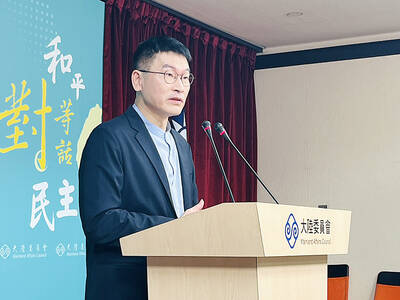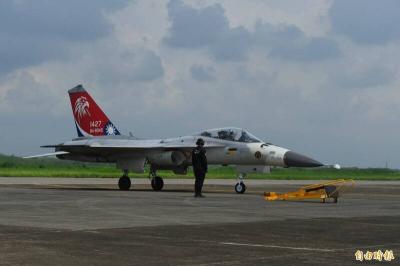China's military modernization strategy is to deter US involvement in a cross-strait conflict and to prevail if the US does intervene, said the US-China Commission's annual report to Congress.
The report also warned that the removal of the EU arms embargo against China currently under consideration would accelerate Beijing's weapons modernization and dramatically enhance Chinese military capabilities.
"A key element of China's military modernization program has extensive acquisitions of foreign military technologies, particularly from Russia," the report said. "[The removal of the EU arms embargo would then] dramatically enhance Chinese military capabilities and might lead Russia to authorize the export of even more sophisticated systems to China."
The commission's report includes the details of its investigations into nine specific areas that were identified by Congress for the commission's review and recommendations.
These areas include China's economic reforms, US economic transfers to China, Chinese government's media control efforts and China's economic and security impact in Asia.
To examine China's military modernization and the cross-strait balance, the commission held a hearing on Feb. 6. In addition to experts and analysts, the commission heard from senior State and Defense Department officials on developments in US-China-Taiwan relations. The commission also supported two research projects on China's arms buildup.
According to the report, China's official defense budget allocation for weapons procurement showed an approximately 1,000 percent increase over a 12-year period, outpacing China's rapid growth in GDP.
The share of the budget devoted to weapons procurement also increased, from 16.3 percent in 1990 to 33.8 percent in 2002. Although the officially announced budget this year is more than US$25 billion, the report believed that the budget is grossly underreported.
It is estimated that China's total defense-related expenditures this year may be between US$50 to US$70 billion, ranking China third in defense spending after the US and Russia.
While China's missile threat is extremely serious, Taiwan has "limited dedicated military assets to guard against such an attack," the report said.
"China's increasing ballistic missile inventory may have already in fact altered the status quo in the Taiwan Strait," it said. "The necessity of maintaining a US policy of ambiguity concerning Taiwan's de jure status should not blind us to the de facto shift that is taking place in the military balance."
The report also pointed out that China's weapon development and acquisitions are an increasing challenge to American technical military superiority in the region.
"The Chinese strategy of improving its force options versus Taiwan and the ability to deter and counter US military intervention is fast becoming a reality," the report said. "China is no longer purchasing massive numbers of weapons systems but is pursuing initiatives to obtain licenses and to co-produce weapons for export."
This was a significant emerging issue, the report said, as this level of cooperation with Russia would help China's goal of being "a modern weapons-producing nation."
"It appears the Chinese buildup is designed to forestall measures that China perceives as steps toward independence by Taiwan and to coerce Taiwan to end the island's continued separate status," it said.

LOW RISK: Most nations do not extradite people accused of political crimes, and the UN says extradition can only happen if the act is a crime in both countries, an official said China yesterday issued wanted notices for two Taiwanese influencers, accusing them of committing “separatist acts” by criticizing Beijing, amid broadening concerns over China’s state-directed transnational repression. The Quanzhou Public Security Bureau in a notice posted online said police are offering a reward of up to 25,000 yuan (US$3,523) for information that could contribute to the investigation or apprehension of pro-Taiwanese independence YouTuber Wen Tzu-yu (溫子渝),who is known as Pa Chiung (八炯) online, and rapper Chen Po-yuan (陳柏源). Wen and Chen are suspected of spreading content that supported secession from China, slandered Chinese policies that benefit Taiwanese and discrimination against Chinese spouses of

ALIGNED THINKING: Taiwan and Japan have a mutual interest in trade, culture and engineering, and can work together for stability, Cho Jung-tai said Taiwan and Japan are two like-minded countries willing to work together to form a “safety barrier” in the Indo-Pacific region, Premier Cho Jung-tai (卓榮泰) yesterday said at the opening ceremony of the 35th Taiwan-Japan Modern Engineering and Technology Symposium in Taipei. Taiwan and Japan are close geographically and closer emotionally, he added. Citing the overflowing of a barrier lake in the Mataian River (馬太鞍溪) in September, Cho said the submersible water level sensors given by Japan during the disaster helped Taiwan monitor the lake’s water levels more accurately. Japan also provided a lot of vaccines early in the outbreak of the COVID-19 pandemic,

PROMOTION: Travelers who want a free stopover must book their flights with designated travel agents, such as Lion Travel, Holiday Tours, Cola Tour and Life Tours Air Canada yesterday said it is offering Taiwanese travelers who are headed to North America free stopovers if they transit though airports in Japan and South Korea. The promotion was launched in response to a potential rise in demand for flights to North America in June and July next year, when the US, Canada and Mexico are scheduled to jointly host the FIFA World Cup, Air Canada said. Air Canada offers services to 13 of the 16 host cities of the tournament’s soccer games, including Toronto and Vancouver; Mexico City, Guadalajara and Monterrey in Mexico; Atlanta, Georgia; Boston; Dallas; Houston;

The US approved the possible sale to Taiwan of fighter jet spare and repair parts for US$330 million, the Pentagon said late yesterday, marking the first such potential transaction since US President Donald Trump took office in January. "The proposed sale will improve the recipient's capability to meet current and future threats by maintaining the operational readiness of the recipient's fleet of F-16, C-130," and other aircraft, the Pentagon said in a statement. Trump previously said that Chinese President Xi Jinping (習近平) has told him he would not invade Taiwan while the Republican leader is in office. The announcement of the possible arms